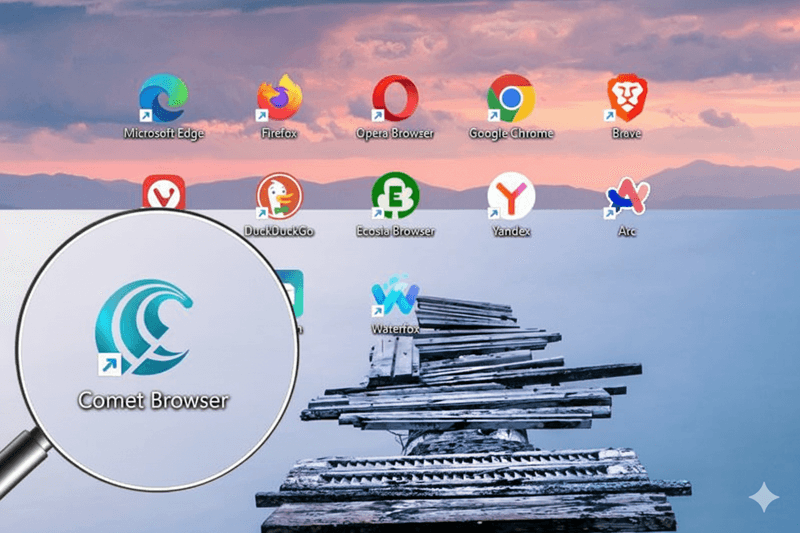After our in-depth comparison “Which Is the Fastest Desktop Browser in 2025”, where we tested 11 desktop browsers under the most controlled conditions possible, it’s time to see where Comet Browser stands — a newly launched AI-centered browser now available to the public.
Comet promises an “AI-assisted browsing experience,” but what happens when we look at it purely from a raw performance standpoint?
We decided to subject it to the exact same tests used in our original benchmark — to see whether its innovations come at a speed cost, or, on the contrary, if it can compete head-to-head with the established giants.
How We Tested
We used the same hardware and software setup from the previous test to ensure perfectly comparable results:
- System: Lenovo ThinkCentre M720q
- Processor: Intel Core i3-8100T
- RAM: 8 GB DDR4
- SSD: Samsung 860 EVO
- Operating system: Windows 11 Pro (build 24H2)
- Connection: Stable gigabit Ethernet
- Tested browser: Comet Browser (public build, October 2025)
The browser was installed on a clean system with no extensions, and each benchmark was run three times, averaging the final results.
Settings remained at their defaults — exactly as the browser installs for the first time.
Why We Test on a “Modest” PC
Some might argue that performance tests should use high-end systems. We believe the exact opposite.
We deliberately chose a mini PC with decent, but far from top-tier specs — the same Lenovo M720q with an i3-8100T and 8 GB of RAM — for the same reason Google measures site performance in PageSpeed Insights on modest devices:
If something runs smoothly on mid-range hardware, it’ll be flawless on modern systems.
The purpose of the test isn’t to show how powerful the computer is, but how efficient the browser is in real-world conditions — close to what most users experience.
Benchmarks Used
Just like in the original test, we ran eight recognized web benchmarks, covering every major performance aspect relevant to a modern browser:
- Basemark Web 3.0 — overall HTML5, CSS, WebGL performance
- Jetstream — JavaScript and WebAssembly engine speed
- MotionMark 1.2 — graphical rendering and complex animations
- Speedometer 3.0 — web app interactivity speed
- Kraken 1.1 — intensive data processing (lower score = better)
- Octane — general JavaScript performance (higher score = better)
- BMark — combined DOM, CSS, and JS processing
- SunSpider — historical JavaScript execution test (lower score = better)
How “Gadgetisimo Points” Are Calculated
To objectively compare browsers, we used the same normalization algorithm as in our original benchmark:
- For tests where a higher score is better:
- Normalized score = (Browser score / Maximum score obtained) × 100
- For tests where a lower score is better (ms):
- Normalized score = (Minimum score obtained / Browser score) × 100
- Final “Gadgetisimo Points” score:
- Arithmetic mean of all 8 normalized scores
Comet Browser Results
| Benchmark | Final Score Comet | Observations |
|---|---|---|
| Basemark Web 3.0 | 641.5 | good result, close to Brave |
| JetStream | 174.37 | excellent, above Chrome 127 |
| MotionMark 1.2 | 572.1 | weaker in graphical rendering |
| Speedometer 3.0 | 12.2 | very close to Chrome |
| Kraken 1.1 (ms) | 891.5 | stable, upper-mid range |
| Octane | 43274 | very good, top 3 |
| BMark | 3877.5 | consistent, close to Ecosia |
| SunSpider (ms) | 82.1 | highly competitive |
Gadgetisimo Points (Comet): 90.83 / 100
Comet vs. the Fastest Browsers of 2025
| Rank | Browser | Gadgetisimo Points | Difference Compared to Comet |
|---|---|---|---|
| 1 | Edge | 97.72 | 6.89 |
| 2 | DuckDuckGo | 95.4 | 4.57 |
| 3 | Chrome | 94.29 | 3.46 |
| 4 | Brave | 91.15 | 0.32 |
| 🆕 | Comet | 90.83 | — |
| 5 | Ecosia | 90.22 | −0.61 |
Analysis and Observations
Comet feels like a mature browser, with a clean, minimalist interface. The AI component is subtly integrated in the top-right corner as an assistant — visible but not intrusive.
Its raw performance is quite solid for such a young product; here, the Chromium engine clearly makes a difference in JavaScript-heavy tasks.
Key takeaways:
- Fast startup, similar to Edge and Brave.
- Decent graphical rendering, though the MotionMark score still lags slightly behind Chrome and Edge.
- Full support for extensions from the Chrome Web Store.
- The AI assistant stays out of the way — it doesn’t slow down the browsing experience.
- Minor visual issue: on launch, the browser briefly flashes a white screen before switching to dark mode — a small but noticeable effect, especially at night in dark environments.
Conclusion
Comet Browser proves that an AI-powered browser doesn’t have to sacrifice performance.
In our Gadgetisimo tests, Comet ranks directly in the top 5, alongside Brave and Ecosia — outperforming established names like Opera and Firefox.
While Microsoft Edge remains the undisputed champion of raw speed in 2025, Comet emerges as a “smart” alternative — just as fast, but with integrated AI features that could change the way we navigate the web.
Also read: Which Is the Fastest Desktop Browser in 2025 — for the full comparison of all 11 browsers tested

